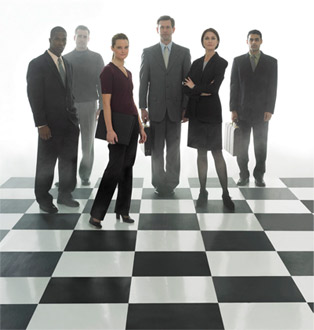 What Kind of Thinker are You?
What Kind of Thinker are You?
You are what you think. Whatever you are doing, whatever you feel, whatever you want—all are determined by the quality of your thinking. If your thinking is unrealistic, your thinking will lead to many disappointments. If your thinking is overly pessimistic, it will deny you due recognition of the many things in which you should properly rejoice.
Think Critically – to enhance your effectiveness in every part of your professional life
The world gets more complex every day. There is only one way to cope – through command of your mind. Thinking more effectively gives you greater control over your life, helps you deal better with adversity, and, believe it or not, transform more of your dreams into reality. Effective thinking is no mystery. It consists of practical skills anyone can learn, practice and improve. Critical thinking offers those skills to anyone willing to do the work to acquire them.
Learn to Make Better Decisions through Critical Thinking
To live is to act. To act is to decide. Everyday work and life are an endless sequence of decisions. Some of the decisions are small and inconsequential, and some are large and life-determining. When your patterns of decision-making are rational, you live a rational life. When your patterns are irrational, you live an irrational life. Rational decisions maximize the quality of your life and your chances of happiness, successful living, and fulfillment. Critical thinking improves your decision-making abilities by raising your patterns of decision-making to the level of conscious and deliberate choice.
Critical thinking, when deeply understood, enables you to take control of the thinking you are doing in every part of your life. It enables you to solve problems more effectively, make better decisions, as well as recognize pathological and manipulative thinking.
Using the resources listed here you will learn:
- Practical skills for thinking more clearly.
- How to use your mind to achieve your goals and enhance your life.
- How to analyze your thinking and the thinking of others
- How to assess your thinking and the thinking of others
- How to overcome obstacles to effective self-reflection
- How to become more effective in your business and personal relationships
- Strategies for continuing to develop after you leave the seminar.
The following articles and pages will help you build a stronger understanding of the core concepts in critical thinking
{"id":"2286","title":"","author":"","content":"<p><strong style=\"color: #000080;\">Using the resources listed here you will learn:</strong></p>\r\n<ul type=\"disc\">\r\n<li><span><span>Practical skills for thinking more clearly.</span></span></li>\r\n<li><span><span>How to use your mind to achieve your goals and enhance your life.</span></span></li>\r\n<li><span><span>How to analyze your thinking and the thinking of others</span></span></li>\r\n<li><span><span>How to assess your thinking and the thinking of others</span></span></li>\r\n<li><span><span>How to overcome obstacles to effective self-reflection</span></span></li>\r\n<li><span><span>How to become more effective in your business and personal relationships</span></span></li>\r\n<li><span><span>Strategies for continuing to develop after you leave the seminar.</span></span></li>\r\n</ul>\r\n<p> </p>\r\n<p><span> The following articles and pages will help you build a stronger understanding of the core concepts in critical thinking</span></p>\r\n<ul>\r\n<li><a class=\"link\" style=\"padding: 2px; font-weight: bold;\" href=\"https://www.criticalthinking.org/articles/becoming-a-critic.cfm\">Becoming a Critic Of Your Thinking</a></li>\r\n<li><a style=\"padding: 2px; font-weight: bold;\" href=\"https://www.criticalthinking.org/courses/Elements_standards_model.cfm\">Learning the Elements and Standards online</a></li>\r\n<li><a class=\"link\" style=\"padding: 2px; font-weight: bold;\" href=\"https://www.criticalthinking.org/articles/glossary.cfm\">Glossary of Critical Thinking Terms</a></li>\r\n<li><a class=\"link\" style=\"padding: 2px; font-weight: bold;\" href=\"https://www.criticalthinking.org/articles/universal-intellectual-standards.cfm\">Universal Intellectual Standards</a></li>\r\n<li><a class=\"link\" style=\"padding: 2px; font-weight: bold;\" href=\"https://www.criticalthinking.org/articles/valuable-intellectual-traits.cfm\">Valuable Intellectual Traits</a></li>\r\n<li><a class=\"link\" style=\"padding: 2px; font-weight: bold;\" href=\"https://www.criticalthinking.org/articles/ct-distinguishing-inferencs.cfm\">Distinguishing Between Inferences and Assumptions</a></li>\r\n<li><a class=\"link\" style=\"padding: 2px; font-weight: bold;\" href=\"https://www.criticalthinking.org/articles/thinking-with-concepts.cfm\">Thinking With Concepts</a></li>\r\n</ul>\r\n<p><br style=\"clear: both;\" /></p>","public_access":"1","public_downloads":"1","sku":"","files":[],"images":[]}
 What Kind of Thinker are You?
What Kind of Thinker are You?